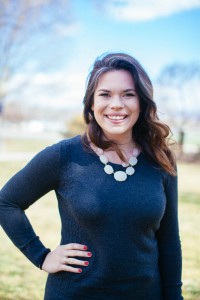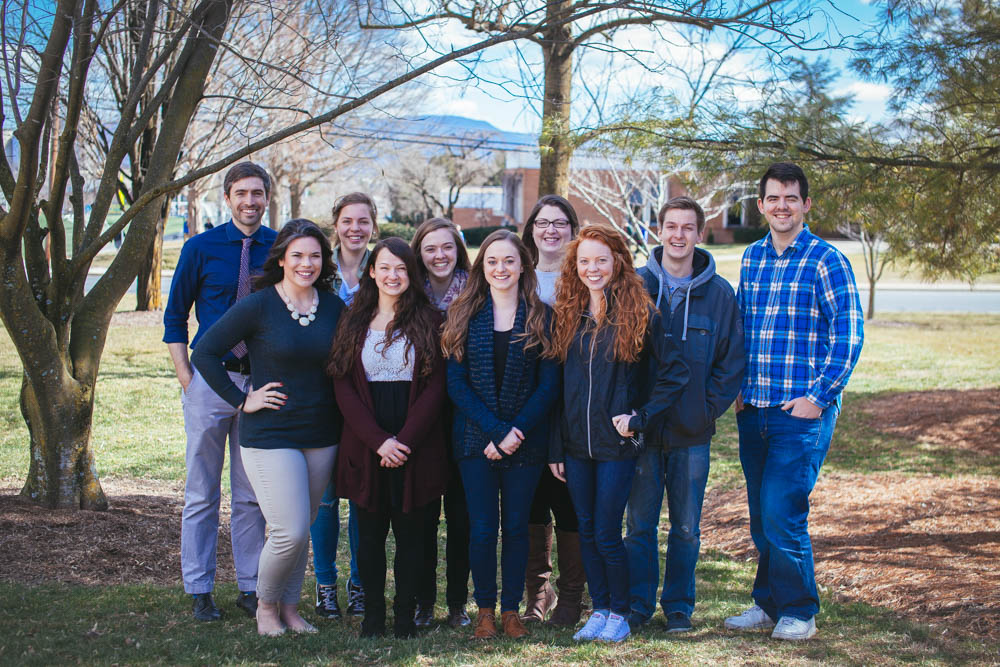After a deaf friend shared that deaf people often feel socially isolated and marginalized by the hearing community, Jessie Wheatley applied what she’d learned in the past four years of psychology coursework at Eastern Mennonite University (EMU).
Her research question: What are the differences between how hearing people think they view the deaf community and how they actually view the deaf community?
Wheatley is one of nine senior psychology majors selected to present their findings at the Virginia Association for Psychological Science annual conference April 20-22, 2016, in Newport News, Virginia. All of the students are classmates in a two-semester applied psychology research course taught by Professor Gregory Koop.

For most students, their projects have led not only to the desired academic goals, but also to personal revelation and clarity of professional goals.
Wheatley, for example, is also involved in an independent study in Deaf culture and community, and she has plans to continue the research in graduate school. And that friend who shared the feelings that were the impetus behind Wheatley’s research? Her future mother-in-law.
With curriculum change, students enter research process earlier
A strength of the psychology program at EMU is that all students have the opportunity to conduct individual research on a topic related to their unique interests, says department chair Kim Brenneman. “These original projects introduce every student to the ins and outs of scientific inquiry.”
Senior psychology majors at EMU enter the research course with a “broad background in the field of psychology,” having fulfilled prerequisites of general, developmental, social and cognitive psychology, as well as a course on interpersonal relationships among others, Koop said. They all have been introduced formally to the research process in the Cognitive Psychology class, where each student formulates a research proposal.
Many of those proposals then develop into the independent research project required in Psychology 472/473, Koop says.
New curriculum that begins next year will introduce the design and analysis portions of the research process earlier, an emphasis which will not only build critical skills but quickly immerses majors in the intellectual rigor of their discipline.
Topics move students deeper into field
In Psychology 472/473, students delve into the research process while designing, developing and implementing their own project. The individualized research projects is intended to create “more critical consumers of scientific results” and “strong candidates for graduate programs,” Koop said.
Most of the classmates expressed both a new appreciation for the “intricacies of research,” as one student put it, and also for the seriousness of the endeavor. “It takes such precaution to make even basic claims,” says Rachel Bowman, who designed an experiment on racial bias.
“When you read a research article, it often seems as though the researchers easily attained the results they are sharing with the world,” said Emily Myers, who has used the project to familiarize herself with attachment theory in preparation for a career in counseling. “In reality, conducting research takes an incredible amount of background research, planning, gaining feedback, working with others, etc.”
In developing her research about developmental trauma associated with foster care and adoption, Bethany Chupp realized her project called for something “along the lines of a doctoral thesis…a longitudinal study of adoptive families over the course of several years.” Setting that aside, she scaled down to the question of whether “changing the vocabulary used to discuss adoption changes participants’ attitudes toward adoption and foster care.”
The title of her project is “Adoption as Trauma: Viewing Adoption Through a Restorative Lens.”
“It takes baby steps to get to bigger goals,” she said. “I need to start a basic level of examining attitudes and language before applying that to concrete case studies.”
Meeting and networking at conferences
Attending conferences is an important professional development opportunity for undergraduate students, Koop said. “You get to test ideas, receive feedback and meet future colleagues. It’s a great experience not only to witness scientists discussing their original work, but to contribute to this exchange of knowledge and develop professional communication skills.”
Other students selected to attend the conference include
- Brooke Lacock, Does Anticipation of Smartphone Notification Interfere with Working Memory Performance?
- Mackenzie Lapp, High and Low Information-Load Music: Implications for Reading Comprehension;
- Kathryn Phillips, Self-Affirmation While Test Taking;
- Sam Swartzendruber, The Effect of Caffeine Deprivation on Sleep Deprived College Students;
- Wesley Wilder, Seeking Clarity: Violent Video Games, Image Quality, and Aggression.

Students need to be congratulated for making the effort. My one regret is that I cannot witness the presentations in person. Keep it up EMU!
Victor Koop, happy to see your name here. I took Intro to Psych from you at GC. My daughter is in this class.
Thrilled to see that students are involved in these kinds of projects as undergrads. Keep up the good work!